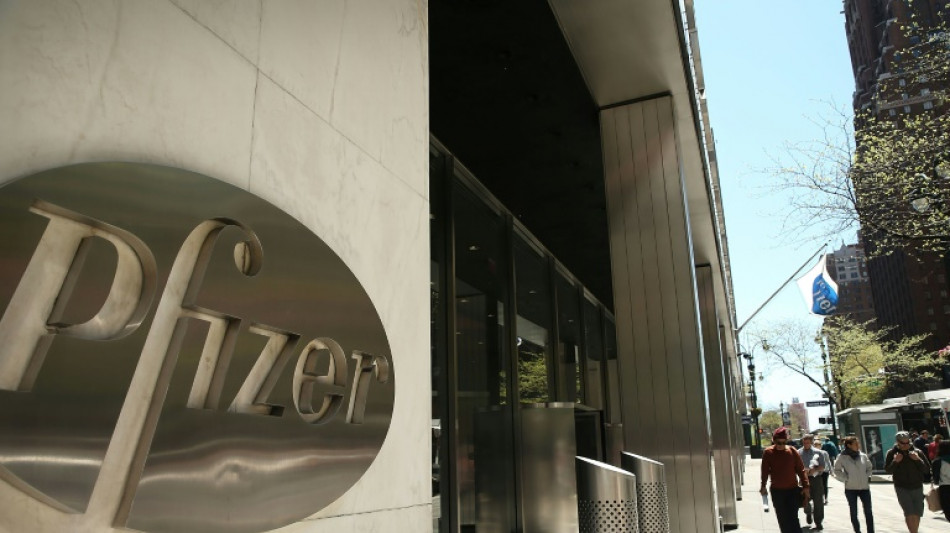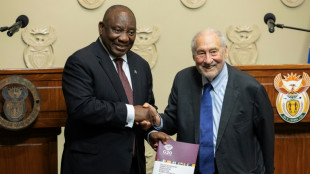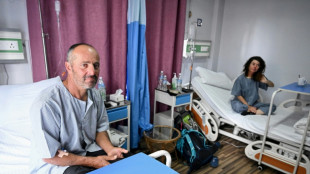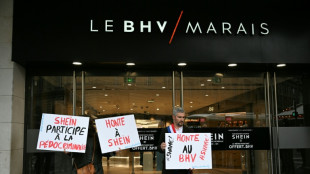
-
 New lawsuit alleges Spotify allows streaming fraud
New lawsuit alleges Spotify allows streaming fraud
-
Stocks mostly drop as tech rally fades

-
 LIV Golf switching to 72-hole format in 2026: official
LIV Golf switching to 72-hole format in 2026: official
-
Manchester City have become 'more beatable', says Dortmund's Gross

-
 Merino brace sends Arsenal past Slavia in Champions League
Merino brace sends Arsenal past Slavia in Champions League
-
Djokovic makes winning return in Athens

-
 Napoli and Eintracht Frankfurt in Champions League stalemate
Napoli and Eintracht Frankfurt in Champions League stalemate
-
Arsenal's Dowman becomes youngest-ever Champions League player

-
 Cheney shaped US like no other VP. Until he didn't.
Cheney shaped US like no other VP. Until he didn't.
-
Pakistan edge South Africa in tense ODI finish in Faisalabad

-
 Brazil's Lula urges less talk, more action at COP30 climate meet
Brazil's Lula urges less talk, more action at COP30 climate meet
-
Barca's Lewandowski says his season starting now after injury struggles

-
 Burn urges Newcastle to show their ugly side in Bilbao clash
Burn urges Newcastle to show their ugly side in Bilbao clash
-
French pair released after 3-year Iran jail ordeal

-
 Getty Images largely loses lawsuit against UK AI firm
Getty Images largely loses lawsuit against UK AI firm
-
Cement maker Lafarge on trial in France over jihadist funding

-
 Sculpture of Trump strapped to a cross displayed in Switzerland
Sculpture of Trump strapped to a cross displayed in Switzerland
-
Pakistan's Rauf and Indian skipper Yadav punished over Asia Cup behaviour

-
 Libbok welcomes 'healthy' Springboks fly-half competition
Libbok welcomes 'healthy' Springboks fly-half competition
-
Reeling from earthquakes, Afghans fear coming winter

-
 Ronaldo reveals emotional retirement will come 'soon'
Ronaldo reveals emotional retirement will come 'soon'
-
Munich's surfers stunned after famed river wave vanishes

-
 Iran commemorates storming of US embassy with missile replicas, fake coffins
Iran commemorates storming of US embassy with missile replicas, fake coffins
-
Gauff sweeps Paolini aside to revitalise WTA Finals defence

-
 Shein vows to cooperate with France in probe over childlike sex dolls
Shein vows to cooperate with France in probe over childlike sex dolls
-
Young leftist Mamdani on track to win NY vote, shaking up US politics

-
 US government shutdown ties record for longest in history
US government shutdown ties record for longest in history
-
King Tut's collection displayed for first time at Egypt's grand museum

-
 Typhoon flooding kills over 40, strands thousands in central Philippines
Typhoon flooding kills over 40, strands thousands in central Philippines
-
Trent mural defaced ahead of Liverpool return

-
 Sabalenka to face Kyrgios in 'Battle of Sexes' on December 28
Sabalenka to face Kyrgios in 'Battle of Sexes' on December 28
-
Experts call for global panel to tackle 'inequality crisis'

-
 Backed by Brussels, Zelensky urges Orban to drop veto on EU bid
Backed by Brussels, Zelensky urges Orban to drop veto on EU bid
-
After ECHR ruling, Turkey opposition urges pro-Kurd leader's release

-
 UK far-right activist Robinson cleared of terror offence over phone access
UK far-right activist Robinson cleared of terror offence over phone access
-
World on track to dangerous warming as emissions hit record high: UN

-
 Nvidia, Deutsche Telekom unveil 1-bn-euro AI industrial hub
Nvidia, Deutsche Telekom unveil 1-bn-euro AI industrial hub
-
Which record? Haaland warns he can get even better

-
 Football star David Beckham hails knighthood as 'proudest moment'
Football star David Beckham hails knighthood as 'proudest moment'
-
Laurent Mauvignier wins France's top literary award for family saga

-
 Indian Sikh pilgrims enter Pakistan, first major crossing since May conflict
Indian Sikh pilgrims enter Pakistan, first major crossing since May conflict
-
Former US vice president Dick Cheney dies at 84

-
 Fiorentina sack Pioli after winless start in Serie A
Fiorentina sack Pioli after winless start in Serie A
-
Oscar-winning Palestinian films daily 'Israeli impunity' in West Bank

-
 Spain's Telefonica shares drop on dividend cut, net loss
Spain's Telefonica shares drop on dividend cut, net loss
-
Fierce mountain storms kill nine in Nepal

-
 Divisive Czech cardinal Dominik Duka dies at 82
Divisive Czech cardinal Dominik Duka dies at 82
-
Shein vows to cooperate with France in sex doll probe

-
 EU in last-ditch push to seal climate targets before COP30
EU in last-ditch push to seal climate targets before COP30
-
Finnish ex-PM Marin says her female cabinet faced torrent of sexism


US approves gene therapy treatment for hemophilia
Pharmaceutical giant Pfizer has received US approval for a gene therapy against a form of hemophilia, a rare and inherited blood clotting disorder, the company said Friday.
Beqvez, which is given as a single intravenous infusion, was shown in a clinical trial of 45 people to be better at preventing bleeding among adults with moderate to severe hemophilia B, compared to regular infusions of a protein that promotes clotting, called protein factor IX (FIX).
The current standard of care is cumbersome, requiring infusions up to several times per week.
"Many people with hemophilia B struggle with the commitment and lifestyle disruption of regular FIX infusions, as well as spontaneous bleeding episodes, which can lead to painful joint damage and mobility issues," said Adam Cuker, director of the University of Pennsylvania's Comprehensive Hemophilia and Thrombosis Program, in a Pfizer statement.
"A one-time treatment with BEQVEZ has the potential to be transformative for appropriate patients by reducing both the medical and treatment burden over the long term."
The therapy was generally well tolerated but a common side effect was elevated liver enzymes, a sign of liver inflammation that wasn't accompanied by outward symptoms. Still, patients are advised to avoid alcohol for up to a year following their treatment, to prevent liver damage.
Patients will be followed up to gather more data for up to 15 years.
Pfizer's genetic therapy targets hemophilia B, the second most common form of the condition, which primarily affects males. More than 38,000 people worldwide live with hemophilia B, according to the World Federation of Hemophilia.
It works by infecting the body with a virus, modified to be harmless, which delivers a functional copy of the factor IX gene to liver cells, instructing them to produce the protein that promotes clotting that the patient otherwise lacks.
It received approval by Canada in January and is awaiting review by the European Medicines Agency.
Pfizer's statement did not mention a list price, which is often a limiting factor for gene therapy treatments. Recently approved sickle cell gene therapies run to $3 to $4 million before insurance.
R.Fischer--VB




